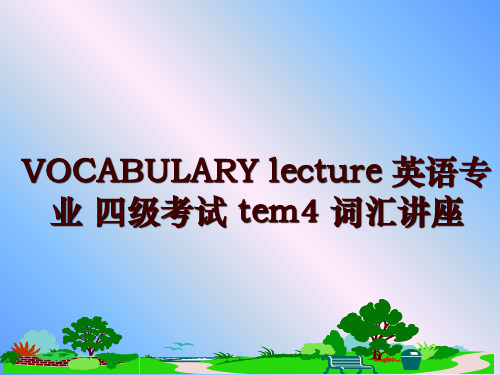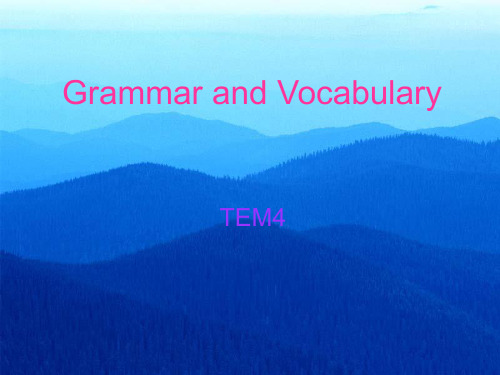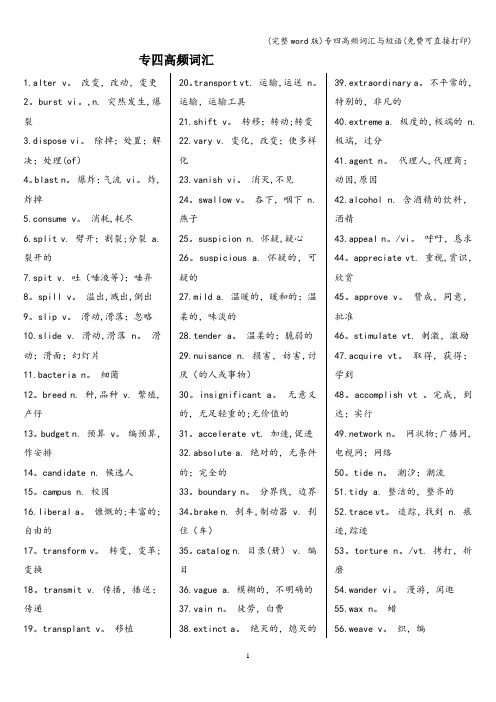专四词汇专题讲座(word文档)
最新VOCABULARY lecture 英语专业 四级考试 tem4 词汇讲座ppt课件

To finish or deal with (sth. Such as work) E.g. I’ve a pile of papers to get through before the meeting.
E.g. The crowd moved aside to let the firemen get by.
To continue to live, often in spite of difficulties ( I) (on, with) 度日
It’s getting on for midnight, let’s go to bed.
B. Get through
To pass through sth. such as a space e.g. The man was so fat that he couldn’t get through the door.
B. get away
To escape, esp from the scene of a crime, or from being caught逃脱 E.g. You should have seen the size of the fish that got away!
To leave, often with some difficulty离开 e.g. I’m sorry I’m late but the telephone rang just as I was about to leave, and I couldn’t get away.
To continue to live through ( difficult times) (T) e.g. I don’t know how poor people get through these cold winters.
英语专四词汇与语法部分讲解

目录
CONTENTS
Vocabulary section Syntactic component The combination of vocabulary and grammar Vocabulary and Grammar in the TEM-4 Exam Suggestions for improving vocabulary and grammar abilities Summary and Outlook
03
The combination of vocabulary and grammar
CHAPTER
Choosing and matching vocabulary is an important aspect of combining vocabulary and grammar in the English Proficiency Test Band 4.
Detailed description
The combination of vocabulary and grammar is the key to language use.
Summary
Detailed description
Candidates not only need to master a certain amount of English vocabulary, understand the fixed combinations and common phrases of vocabulary, but also need to master basic grammar knowledge and be able to choose the correct grammar form to construct sentences according to the context. At the same time, candidates also need to pay attention to the practical use of language and improve their language expression ability. In the English Proficiency Test Band 4, the examination of vocabulary and grammar is not limited to multiple-choice and fill in the blank questions, but also involves multiple aspects such as reading, writing, and translation. Therefore, candidates need to focus on accumulating vocabulary and grammar knowledge in their daily learning, engage in more reading, writing, and translation exercises, and improve their language proficiency.
(完整word版)英语专业四级词汇表(全)

pacific a。
和平的n。
太平洋pack vt。
捆扎;挤满n。
包package n.包裹,包,捆packet n。
小包(裹),小捆pad n。
垫;本子vt。
填塞page n.页pail n.桶,提桶pain n。
痛,痛苦悲伤;辛劳painful a.使痛的;费力的paint vt.画;油漆vi。
绘画painter n.漆工,画家,绘画者painting n。
油画;绘画;着色pair n.一对vi。
成对,配对palace n.宫,宫殿pale a.苍白的;浅的palm n.手掌,手心;掌状物pan n.平底锅,盘子panda n.小猫熊;猫熊pane n.窗格玻璃panel n。
专门小组;面,板pant n。
气喘;心跳paper n.纸;官方文件;文章parade n。
游行;检阅vi。
游行paradise n。
伊甸乐园;天堂paragraph n。
(文章的)段,节parallel a。
平行的;相同的parcel n.包裹,小包,邮包pardon n.原谅;赦免vt.原谅parent n.父亲,母亲,双亲park n。
公园;停车场parliament n.议会,国会part n。
一部分;零件;本份partial a。
部分的;不公平的partially ad.部分地participate vi.参与,参加;分享particle n.粒子,微粒particular a.特殊的;特定的particularly ad。
特别,尤其,格外partly ad。
部分地,不完全地partner n.伙伴;搭挡;配偶party n.党,党派;聚会pass vt。
经过;通过;度过passage n.通过;通路,通道passenger n。
乘客,旅客,过路人passion n.激情,热情;爱好passive a。
被动的;消极的passport n。
护照past a.过去的n.过去paste n。
糊,酱;浆湖pastime n。
专四词汇讲座(王苏雷)

解析TEM4
• achieve • 1 to successfully complete something or get a good result, especially by working hard: • Frances achieved very good exam results. • Wilson has achieved considerable success as an artist. • She eventually achieved her goal of becoming a professor.
解析TEM4
• attain • 1 to succeed in achieving something after trying for a long time: • More women are attaining positions of power. • 2 to reach a particular level, age, size etc: • Share prices attained a high of $3.27. • After a year she had attained her ideal weight. • —attainable adjective: • This target should be attainable.
单词记忆法
• 3. 近义词串联法 • innovate/renovate • evolve/ revolve/involve/resolve
单词记忆法
• 4. 联想记忆 • oman--o man --凶兆 • stationary(静止的l) ---stationery(文具)
艾宾浩斯是第一个对记忆进行系统定量研究 的科学家。艾宾浩斯曲线可以简述为: 记住一段材料之后经过的时间 材料保持量 20分钟 58% 1小时 44& 9小时 36% 1天 33% 2天 28& 6天 25% 31天 21%
专四语法词汇课件lecture 1

TEM4
语法常考点
一、虚拟语气
1. if, unless, otherwise引导的从句
表示虚拟的时间 条件从句的谓语形式 主句谓语形式
与现在相反
与过去相反
过去式(did)/be动词用were
过去完成式(had done)
would /should/might/could +do
3. Wish“希望” ,从句用一般过去时或过去完成时。
4. If only“要是…就好了”,从句用一般过去时或过去 完成时。
5. But for“要不是”,given…, provided…., providing (that)…, supposing (that)…,后接名词短 语或从句,表示条件,意为“如果”;主句用虚拟语 气。
C. has betrayed…took
D. has betrayed….take
B 2. If only I ______ play the guitar as well as you!
A. would B. could C. should D. might C 3. _______ enough time and money, the researchers would have been able to discover more in this field. A. Giving B. To given C. Given D. Being given
2. It is imperative/recommended that students A _______ their term papers on time.
A. hand in B. would hand in
专业四级语法词汇练习有真题讲解(DOC)

英语专业四级语法、词汇知识讲座1.《教学大纲》对英语专业语法的总体描述是:能识别词类;区分名词的可数性和不可数性,可数名词的单、复数形式;基本掌握各种代词的形式与用法、基数词和序数词、常用介词和连词、形容词和副词的句法功能、比较级和最高级的构成及基本句型、冠词的一般用法;了解动词的主要种类、时态、语态及不定式和分词的基本用法、句子种类、基本句型和基本构词法。
掌握主谓一致关系、表语从句、宾语从句、定语从句和状语从句等句型、直接引语和间接引语的用法、动词不定式和分词的用法、各种时态、主动语态、被动语态和构词法。
其中对四级的要求是:除掌握上述内容外,还应该熟练掌握主语从句、同位语从句、倒装句和各种条件句。
2.《教学大纲》对英语专业词汇的总体描述是:认知词汇不少于2,000个;掌握1,200个左右的常用词和一定数量的习惯用语及固定搭配,并能在口语中运用;认识740个左右的单词和一定数量的习惯用语及固定搭配,能根据上下文的提示理解其含义。
通过基础英语课、阅读课和其他途径认知词汇达4,000~5,000个(其中含中学已学的2,000个),正确而熟练地使用其中的2,000~2,500个及其最基本的搭配。
其中对四级的要求是:通过基础英语课、阅读课和其他途径认知词汇5,500 6,500个(含第二级要求的4,000~5,000个),正确而熟练地运用其中的3,000~4,000个及其最基本的搭配。
近年来专业四级考试中Grammar and Vocabulary部分中,50%为词汇、词组和短语的用法,约50%为语法结构。
该题在总分中虽占分不多,但作为测试考生英语水平之基础,它对于TEM4中所有题项影响之大是众所周知的,因为任何一门外语的学习均始于词汇和语法,且对于词汇数量及其深度的掌握程度在一定意义上反应一个人的英语水平。
因此,掌握词汇和语法对于在TEM4中取得好成绩显得尤为重要。
综观这近几年考题,可发现:1.语法考题的涉及面宽,近年考题曾经考到:几乎所有词类;三种动词的非谓语形式;各种从句及关系词的用法;动词时态、虚拟语气、情态动词的用法;独立主格,主谓一致,倒装,强调、并列结构等基本语法知识。
专四词汇讲解

YOUNG LAU
4
• .change : 指任何变化,完全改变,强调与 原先的情况有明显的不同。 • Flyovers have changed the face of the city. • (立交桥改变了城市的面貌。)
• alter 所表示的“改变”只是细节的,或外表的变化,并不表示本质的改 变。 • 如:把一件衣服改小一些或只把衣袖稍放肥一些,但衣服的式样仍然不变, • 它还可以表示改变计划,现状,生态,习惯,倾向,结果,历史进程,主 意等 • Can you alter this suit for me? • 你可以为我修改这套衣服吗? The contract does not alter the status quo. • 合同不能改变现状。 • Pollution can alter the ecology of an area. • 污染会改变一个地区的生态。
• • • • • • • • • 1. Attendance at evening prayers is not compulsory. 参加晚祷并非硬性规定。 2. Attendance at my lectures has fallen off considerably. 听我讲课的人已大大减少了。 3. Attendance at the concert was very poor. 那次音乐体上,小的接在大 的上面,活动的接在固定的上面。 associate指人与人友好和平、平等地联合 在一起;用于物时,指两事物因历史或其 它原因,很自然被人们联系在一起,即产 生联想。 relate指人与人有亲戚或婚烟关系;也指人 或物之间尚存的实际或假想的联系。
17
• Differ in; • be different in 在..不同
(完整word版)专四高频词汇与短语(免费可直接打印)

专四高频词汇1.alter v。
改变,改动,变更2。
burst vi。
,n. 突然发生,爆裂3.dispose vi。
除掉;处置;解决;处理(of)4。
blast n。
爆炸;气流 vi。
炸,炸掉5.consume v。
消耗,耗尽6.split v. 劈开;割裂;分裂 a.裂开的7.spit v. 吐(唾液等);唾弃8。
spill v。
溢出,溅出,倒出9。
slip v。
滑动,滑落;忽略10.slide v. 滑动,滑落 n。
滑动;滑面;幻灯片11.bacteria n。
细菌12。
breed n. 种,品种 v. 繁殖,产仔13。
budget n. 预算 v。
编预算,作安排14。
candidate n. 候选人15。
campus n. 校园16.liberal a。
慷慨的;丰富的;自由的17。
transform v。
转变,变革;变换18。
transmit v. 传播,播送;传递19。
transplant v。
移植20。
transport vt. 运输,运送 n。
运输,运输工具21.shift v。
转移;转动;转变22.vary v. 变化,改变;使多样化23.vanish vi。
消灭,不见24。
swallow v。
吞下,咽下 n.燕子25。
suspicion n. 怀疑,疑心26。
suspicious a. 怀疑的,可疑的d a. 温暖的,暖和的;温柔的,味淡的28.tender a。
温柔的;脆弱的29.nuisance n. 损害,妨害,讨厌(的人或事物)30。
insignificant a。
无意义的,无足轻重的;无价值的31。
accelerate vt. 加速,促进32.absolute a. 绝对的,无条件的;完全的33。
boundary n。
分界线,边界34。
brake n. 刹车,制动器 v. 刹住(车)35。
catalog n. 目录(册) v. 编目36.vague a. 模糊的,不明确的37.vain n。
- 1、下载文档前请自行甄别文档内容的完整性,平台不提供额外的编辑、内容补充、找答案等附加服务。
- 2、"仅部分预览"的文档,不可在线预览部分如存在完整性等问题,可反馈申请退款(可完整预览的文档不适用该条件!)。
- 3、如文档侵犯您的权益,请联系客服反馈,我们会尽快为您处理(人工客服工作时间:9:00-18:30)。
专四词汇专题讲座如何突破考试前的“高原期”•或许我们都有这样的体验,考试前复习功课到一定程度后,尤其是复习一两遍之后,便会产生一种莫名的厌倦情绪,不想再看复习材料了。
想一想,又觉得自己还有许多地方复习不到家,但是又腻烦得很;精神困倦,可想睡又睡不着;注意力分散,读了几行字竟不知其什么意思,还要从头再读……•一、要设法使自己的头脑冷静下来,不要着急。
要明白“高原期”是下一个飞跃的前奏。
这个停顿是必然要出现的。
不经过这个阶段,就不会到达巅峰。
•二、把自己要复习的功课总结、对比一下,根据教学和考试大纲的要求去寻找差距。
•三、认真对待各种测验和模拟考试。
•四、一切杂事尽快办完,即使办不完的,也最好放下来,集中精力抓复习。
我奉劝大家不要老是在找所谓的“捷径”,踏踏实实的走好每一步才是王道。
• Know the enemy and know yourself, and you can fight a hundred battles without defeat.----知彼知己,百战不殆•专四词汇知多少?•专四词汇考什么?•词汇怎么来扩大?•专四词汇难点与考点解析专四词汇知多少?专四词汇知多少???•How many words are there in English?•Two separate studies (Dupuy, 1974; Goulden, Nation and Read, 1990) have looked at the vocabulary of Webster's Third International Dictionary (1963), the largest non-historical dictionary of English when it was published. When compound words, archaic words, abbreviations, proper names, alternative spellings and dialect forms are excluded, and when words are classified into word families consisting of a base word, inflected forms, and transparent derivations, Webster's 3rd has a vocabulary of around 54,000word families. This is a learning goal far beyond the reaches of second language learners and, as we shall see, most native speakers.•At present the best conservative rule of thumb that we have is that up to a vocabulary size of around 20,000 word families, we should expect that native speakers will add roughly 1000 word families a year to their vocabulary size. That means that a five year old beginning school will have a vocabulary of around 4000 to 5000 word families. A university graduate will have a vocabulary of around 20,000 word families (Goulden, Nation and Read, 1990). These figures are very rough and there is likely to be very large variation between individuals. These figures exclude proper names, compound words, abbreviations, and foreign words. A word family is taken to include a base word, its inflected forms, and a small number of reasonably regular derived forms (Bauer and Nation, 1993).• Clearly the learner needs to know the 3,000 or so highfrequency words of the language. These are an immediate high priority and there is little sense in focusing on other vocabulary until these are well learned.• Nation (1990) argues that after these high frequency words are learned, the next focus for the teacher is on helping the learners develop strategies to comprehend and learn the low frequency words of the language.•请问专四考试要求的词汇量是多少?与大学英语六级相比,哪个考试词汇量要求更大?•高等学校英语专业教学大纲规定专四水平学生应认知词汇5,500~6,500个,正确而熟练地运用其中的3,000~4,000个及其最基本的搭配。
而考生们比较熟悉的大学英语六级考试要求5,500个单词。
•从考纲规定来说,专四的词汇量比六级更大,而且专四对词汇搭配、词义辨析考查得更加细化和专业;由于新六级考试已经取消了词汇语法题,因此在词汇用法的掌握方面要求明显低于专四。
•这里面尤其要注意,专四毕竟跟非英语专业的英语基础水平测试题目有不同,他要考察的是英语专业学生的技能,所以常常会对一些高难度的词法和语法点有所涉及。
所以也要学会记住各个考点所涉及的难点和例外情况(词法和语法的一个特色在于他们经常会有例外)。
•有些内容是需要强硬记住的,他们常常不符合任何规则,是一种惯例,这就是语言的特色,很多东西是约定俗成的,没有什么理由可以推敲,对付他们最好的办法就是见到一个记牢一个,这在专四考试里也屡见不鲜,要特别留意。
专四词汇考什么?•语法与词汇部分,考试时间是15分钟。
测试形式采用多项选择题,从2005年开始,本部分为30道题,每题有4个选项:题目中大约50%为词汇词组和短语用法题,50%为语法结构题。
分数比例:每题0.5分,共15分。
辨析固定搭配根据逻辑关系作出判断词汇怎么来扩大?•怎么办?怎么扩大词汇量?•Betty advised me to label our luggage carefully in case is gets _____ in transit.• A. misused B. mishandled C. mistaken D. mislaid•I must have mistaken your meaning/what you meant.•Don‟t mistake me, I mean what I say.•( get a wrong idea about sb/sth)•She is often mistaken for her twin sister.•(Wrongly suppose that sb/sth is sb/sth else)前缀记忆法•前缀(prefix),就是附加在词根前面的部分,具有一定的含义,通常改变词的意义而不改变词类。
前缀prefix这个词本身就是由前缀pre- (前)加词根fix(固定,缀)构成的。
前缀在构词中的地位和作用仅次于词根。
同一前缀pre-可以在许多不同的词中出现。
•monogamy•monolingual•monoxide•monologue•monoplane•monomolecular•monotonous建立词与词之间的关联记忆• Heavy Rain 大雨• Heavy Rain Icy 大冰雨• Heavy Snow 大雪• Heavy T-Storm 强烈雷雨• Isolated T-Storms 局部雷雨• Light Drizzle 微雨• Light Rain小雨• Light Rain Shower 小阵雨• Light Rain with Thunder 小雨有雷声• Light Snow 小雪• Light Snow Grains 小粒雪• Light Snow Shower 小阵雪• Lightening 雷电• Mist 薄雾• Rain Shower 阵雨• Scattered Showers 零星阵雨• Scattered Snow Showers 零星阵雪• Scattered Strong Storms 零星强烈暴风雨• Scattered T-Storms 零星雷雨• Showers 阵雨• Showers Early 早有阵雨• Showers Late 晚有阵雨• Showers in the Vicinity(邻近)周围有阵雨• Snow / Rain Icy Mix 冰雨夹雪• Snow and Fog 雾夹雪• Snow Shower 阵雪• Snowflakes 雪花• Sunny 阳光• Thunder 雷鸣• Thunder in the Vicinity 周围有雷雨• T-Storms Early 早有持续雷雨• T-Storms Late 晚有持续雷雨• Windy 有风• Windy Rain 刮风下雨• Wintry Mix 雨雪混合通过阅读来扩大词汇量•To read well, you need a strong vocabulary. To build a strong vocabulary, you need to read well.•Nation & Waring (1997)的调查结果显示:在阅读中通过语境学习词汇,是外语学习者词汇量增加的主要手段。
